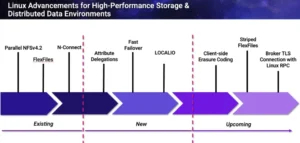
Hammerspace Advances the Linux Kernel with Innovations for Enterprise and HPC/AI Storage
SAN MATEO, Calif., Dec. 3, 2024 – Hammerspace, the company orchestrating the next data cycle, has announced the significant contributions it has made to the Linux kernel, transforming standard Linux servers into powerful platforms for enterprise, AI and HPC file and object storage. These contributions – engineered by Hammerspace and available as part of standard Linux distributions – enable enterprises to achieve unprecedented performance and scalability with trusted, easy-to-deploy open standards.
This commitment to standard Linux ensures organizations do not need to install proprietary client software or alter existing storage while still taking advantage of unique Hammerspace features such as a unified global namespace with advanced non-disruptive data orchestration that seamlessly spans vendor silos, multiple data centers and cloud resources.
“The enhancements to NFSv4.2, driven by Hammerspace and the open-source community, are transforming the protocol to meet the demands of today’s distributed and high-performance workloads. Features like LOCALIO, FlexFiles, Attribute Delegations, and Fast Failover are designed to deliver unmatched performance, reliability, and scalability. These innovations cement NFS as a modern, intelligent storage protocol, poised to support the future of enterprise, AI and high-performance computing workloads,” added Trond Myklebust, Linux NFS client kernel maintainer.
The latest capabilities, all available in the 6.12 Linux kernel, include:
- Parallel reads and writes across multiple servers.
Parallel NFSv4.2 with FlexFiles splits file data across multiple servers, allowing clients to access data in parallel. When coupled with N-Connect, multiple data paths are unified into a single, efficient stream for workloads requiring massive read or write operations. - Accelerate metadata-heavy workloads by reducing latency.
The new Attribute Delegations allows clients to cache metadata locally, cutting down on repeated server queries. - Ensure uninterrupted access during server failures.
With Fast Failover, workloads from unavailable servers are seamlessly redirected to healthy servers, minimizing downtime. - Optimize data transfer speeds.
For data residing on NFS data servers that are co-located with the application, LOCALIO eliminates data path bottlenecks by delivering data directly without going across the network.
Hammerspace is also unveiling upcoming Linux kernel submissions for 2025 that will continue to advance standards-based storage architectures. These will include:
- Reducing server load for erasure coding.
Client-side Erasure Coding will shift compute-intensive data protection algorithm work to the client, optimizing performance for distributed storage systems. - Boosting parallelism file system performance.
Striped FlexFiles accelerates workloads by striping data across multiple servers for faster, more efficient access. - Enhancing security for connections not protected behind a firewall.
TLS Connection for Linux RPC ensures secure and reliable communication between clients and servers.
“We’re revolutionizing how the world thinks about data architectures, taking distributed storage systems to the next level of speed and efficiency. By advancing NFS and the storage services in the Linux kernel, we’ve made it possible for organizations to unify and supercharge their data – everywhere. These innovations shatter previously held notions for proprietary software requirements on a client machine to deliver parallel file system performance and break down the data silos that otherwise exist between different storage systems and across the hybrid cloud,” said David Flynn, Founder and CEO of Hammerspace. “We are making it possible for enterprise IT, hyperscalers and AI/HPC environments to unlock infrastructure efficiencies no one previously thought possible.”
About Hammerspace
Hammerspace is radically changing how unstructured data is used and preserved. Our Global Data Platform unifies unstructured data across edge, data centers, and clouds. It provides extreme parallel performance for AI, GPUs, and high-speed data analytics, and orchestrates data to any location and any storage system. This eliminates data silos and makes data an instantly accessible resource for users, applications, and compute clusters, no matter where they are located.
Source: Hammerspace




























